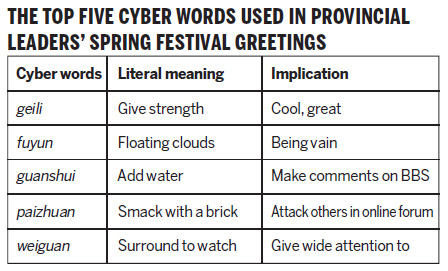Officials plugged into online slang
The hottest cyber words of last year have crept into government and Party leaders' speeches, making the coming Spring Festival more "geilivable".
|
Officials plugged into online slang |
"Geilivable", combining the pinyin geili with the English suffix for adjectives, implies "giving power" or "cool".
Thirty-one provincial officials from the country's 17 provincial-level regions made a ceremonial call on www.people.com.cn on Wednesday, sending greetings to people for the coming Chinese lunar new year, which is only seven days away.
The same Web page also shows 26 greetings from city and county officials.
At least 30 percent of these speeches dispensed with bureaucratic tones and embraced the most popular cyber words developed by Chinese netizens in the past year, such as geili and fuyun (floating cloud, indicating vanity).
For example, the phrase shenma doushi fuyun came from a BBS post in October, implying "everything is meaningless and like fleeting clouds".
Yunnan provincial leader Bai Enpei and Qin Guangrong used the expression to summarize the work of the 11th Five-Year Plan (2006-2010), saying "shenma doushi fuyun, but the scientific outlook on development and transforming the mode of development is exceptionally geili."
Other words broadly used in the speeches include cyber terms like paizhuan (smacking with a brick), weiguan (surround to watch) and guanshui (add water).
"The government and Party leaders are keeping pace with the times in terms of both communication tools and wording," said Fan Hong, a communication professor at Tsinghua University.
The Internet has become the major source of information for China's young, either in business or personal life. As a result, government officials selected the Internet instead of print media to pay a New Year's call to "let their voices be heard by more of the post-'80 generation", Fan said.
"As for the reason for using new cyber words, it makes it easier for officials to connect with the people they are talking to if the two sides speak the same language," she said.
Huang Huang, an e-government expert at the School of Government of Peking University, believes that building a people-oriented image is the latest trend in officialdom.
Huang said local officials are communicating with people more frequently than ever before thanks to the increasing use of the Internet.
"In the past, this kind of online communication was only available in large cities like Beijing and Shenzhen, but now it has swept the country," Huang said.
The website also had a section allowing people to leave comments for local government officials, and to let the officials respond.
However, a Beijing netizen surnamed Lin said he "doubted whether the officials wrote the cyber language themselves, or if their secretaries simply wrote it for them".
 0
0 







